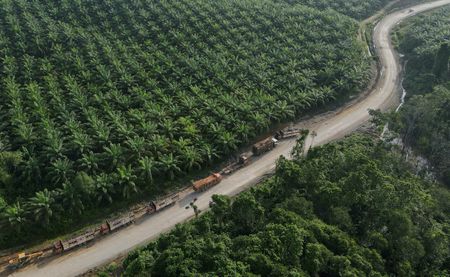 1
1 1
1
By Rajendra Jadhav
MUMBAI (Reuters) -Demand for palm oil has been increasing as its discount to soyoil and sunoil has grown, driven by the recent price rise in rival oils due to production concerns in the U.S. and supply disruptions from the Black Sea region, industry officials said.
This surge in demand is expected to assist Indonesia and Malaysia in bringing down their palm oil inventories, simultaneously bolstering Malaysian palm oil futures.
“Aggressive pricing has been aiding palm oil as buyers are shifting toward palm oil from other oils for near-month shipments,” said Sanjeev Asthana, chief executive officer at Patanjali Foods Ltd, India’s top palm oil buyer.
India, the world’s biggest buyer of edible oils, imported 1.09 million metric tons of palm oil in July, nearly 60% more than June and the highest in seven months.
India’s imports would remain robust during August and September as well, Asthana said.
Crude palm oil is offered at $910 a tonne including cost, insurance and freight (CIF) to India for September shipments, compared with $1,050 and $1,010 for crude soyoil and crude sunflower oil respectively, dealers said.
Soyoil prices jumped in the last one month on production concerns in the United States and lower supplies from top exporting Argentina, while sunflower oil became expensive after Russia withdrew from the Black Sea grains deal, said a New Delhi based dealer with a global trade house.
The Black Sea region accounts for 60% of world sunflower oil output and 76% of exports.
“Palm oil prices didn’t rise; instead, they came down due to rising stocks in the producing countries and become even more cheaper for buyers,” the dealer said.
Price-sensitive Asian buyers traditionally rely on palm oil because of low costs and quick shipping times.
Along with India, China, Bangladesh, and Pakistan have also been raising palm oil purchases for August and September shipments, said a Mumbai-based trader.
China’s July vegetable oil imports, which mainly consist palm oil, jumped 48% from a year ago to 778,000 tonnes.
Palm oil’s discount to rival oils is likely to come down gradually as rising exports would bring down the inventories in both Malaysia and Indonesia, the trader said.
Malaysia’s palm oil exports rose 15.55% to 1.35 million tons in July, according to the Malaysian Palm Oil Board. In the first ten days of August, exports of Malaysian palm oil products rose 17.5% to 383,795 tons, AmSpec Agri Malaysia said on Thursday.
(Reporting by Rajendra Jadhav; editing by David Evans)